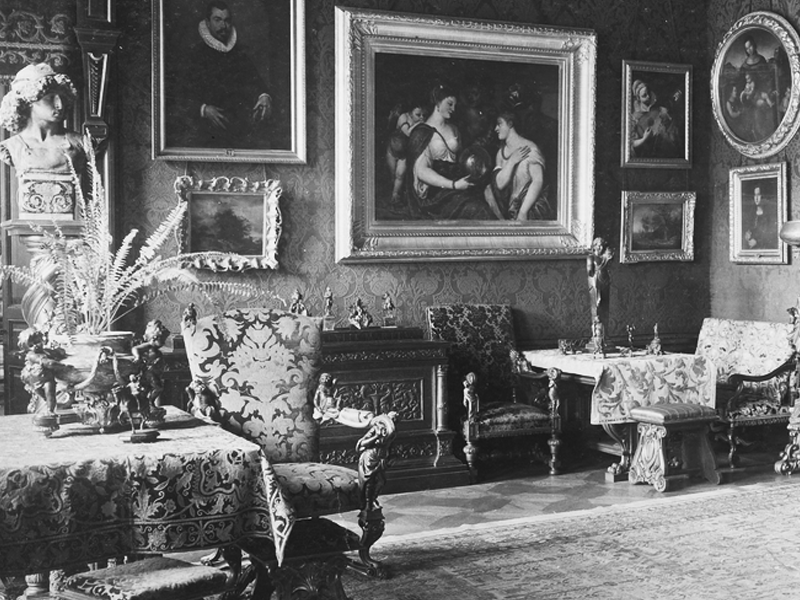
On October 20-21, a series of discussions “Mapping Ukraine in the Museum World: Collections and Practices” was held online. During two consecutive days, experts discussed the place of Ukraine in the decolonization processes of museum institutions. The event was organised jointly with Birkbeck College, University of London, as part of the UK/Ukraine Season of Culture, designed by the Ukrainian Institute and the British Council.
The Russian invasion of Ukraine in February 2022 has reopened a new inquiry into the colonial relationship between Russia and Ukraine. It also enforced rethinking of the meaning and strategies of the decolonisation project as applied to museums. For centuries, Ukraine-born artists have been identified, as well as kept identifying themselves, as Russian artists. How can we balance the exigencies of transnationality, the condition which characterizes Ukrainian arts as a whole, against the practices of cultural appropriation? How could museums outside Ukraine respond to those specific decolonisation issues? How could Ukraine be mapped into the complex geographies of their collections?
Mapping Ukraine in Museums: discussion program jointly with Birkbeck University
On October 20-21, a series of discussions “Mapping Ukraine in the Museum World: Collections and Practices” was held online. During two consecutive days, experts discussed the place of Ukraine in the decolonization processes of museum institutions. The event was organised jointly with Birkbeck College, University of London, as part of the UK/Ukraine Season of Culture, designed by the Ukrainian Institute and the British Council.
The Russian invasion of Ukraine in February 2022 has reopened a new inquiry into the colonial relationship between Russia and Ukraine. It also enforced rethinking of the meaning and strategies of the decolonisation project as applied to museums. For centuries, Ukraine-born artists have been identified, as well as kept identifying themselves, as Russian artists. How can we balance the exigencies of transnationality, the condition which characterizes Ukrainian arts as a whole, against the practices of cultural appropriation? How could museums outside Ukraine respond to those specific decolonisation issues? How could Ukraine be mapped into the complex geographies of their collections?
Day One focused on the very issue of decolonisation and its shifting meanings, especially in the context of the war in Ukraine. Day Two — on discussing the ways in which the museum world, in the largest sense of the term, could support the effort to decolonise museums in the aftermath of the Russian invasion.
Programme and speakers:
20 October
- Introduction: David Codling, British Council, Ukraine UK Season Director; Tetyana Filevska, Creative Director of the Ukrainian Institute, Kyiv and Stephanie Bowry Co-Director, Birkbeck’s Centre for Museum Cultures and Katarzyna Murawska-Muthesius, Birkbeck College
- Ukrainian hybrid orientalism and the paradox of decolonial disposition: Hanna Rudyk,Curator of Islamic art at The Bohdan and Varvara Khanenko National Museum of Arts in Kyiv
- Decolonial approaches in CEE museum cultures: challenges and perspectives: Magdalena Wróblewska, Assistant Professor at the Faculty of „Artes Liberales”, University of Warsaw
- On de-imperializing Ukrainian modern art from museum registries: Myroslava Maria Mudrak, Professor Emerita of the History of Art, The Ohio State University
- Museum military mutual help: the experience of the Museum Crisis Centre: Olha Honchar, Director of the Memorial Museum of Totalitarian Regimes “Territory of Terror” in Lviv
21 October
- Introduction: Tetyana Filevska, Creative Director of the Ukrainian Institute, Kyiv andKatarzyna Murawska-Muthesius, Birkbeck
- Museums strategies during the war: reinventing itself: Yuliia Vaganova, Acting Director of the Bogdan and Varvara Khanenko National Museum of the Arts, Kyiv
- Protecting Ukrainian Heritage – a UK response: Maria Blyzinsky, an independent curator, heritage consultant and writer. Co-founder of The Exhibitions Team
- Odesa Fine Arts Museum: from the imperial tool to the most pro-Ukrainian space of the city: Oleksandra Kovalchuk, Acting Director of the Odessa Fine Arts Museum, Member of the Odesa City Council, leader of the NGO “Museum for change”
- The Time of Stalins and Hitlers is Not Over: Museums Perceiving Decolonisation after Occupation: Tehmina Goskar, Director and Curator of the Curatorial Research Centre, Post-doctoral Research Fellow at the Decolonising Arts Institute, UAL (University of the Arts London), Fellow of the Museums Association.
Photo by The Bohdan and Varvara Khanenko National Museum of Arts.

